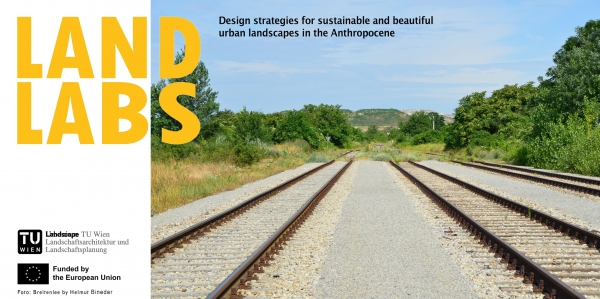5.2 Initiatives and Networks
Doctoral initiatives at the Faculty of Architecture and Planning
There are various initiatives at the Faculty of Architecture and Planning that conduct research on specific topics and are aimed at doctoral students, among others.
LANDLABS - Landscape Laboratories: Design strategies for sustainable and beautiful urban landscapes in the Anthropocene
Direction
The Doctoral Network "LANDLABS" is a research initiative funded by the European Union under the Marie Skłodowska-Curie Actions. Operating across six landscape laboratories throughout Europe, LANDLABS explores new perspectives on the interconnectedness between humans, animals, plants, water, air, soil, and technologies. Through an innovative site-based, research-through-design approach, the network offers young researchers the opportunity to contribute to the critical and urgent issue of the green transition of cities, aligning with the Europeåan Green Deal and the United Nations Sustainable Development Goals.
Consortium Partners
LANDLABS unites researchers from several esteemed institutions, including Leibniz University Hannover, Aarhus School of Architecture, UiT The Arctic University of Norway, University of Ljubljana, University of Porto, and TU Wien. The consortium also collaborates with associated partners from municipal planning departments, fostering a comprehensive approach to sustainable urban landscape design. citeturn0search0 Associated Partners The network collaborates closely with municipal partners from various cities, including the City of Vienna, City of Hanover, City of Aarhus, Municipality of Tromsø, Municipality of Piran, and Municipality of Porto. These partnerships facilitate practical engagement and the implementation of innovative design strategies within diverse urban contexts.
Goals and Perspectives
LANDLABS aims to foster deep engagement with specific sites in collaboration with local municipal planning departments and stakeholders. The primary goal is to explore new perspectives on interconnectedness and to test innovative design strategies for sustainable and beautiful urban landscapes in the Anthropocene. Each site, significantly shaped by human activity, serves as a landscape laboratory where PhD fellows develop and implement design interventions as a central part of their research.
Structure
The doctoral training within LANDLABS is structured into two main phases. In the initial two-year period, each doctoral candidate focuses primarily on their individual landscape laboratory site and related theoretical frameworks. In the third year, the six PhD fellows collaborate in a virtual PhD lab on joint tasks, aiming to develop transferable theories, evaluation criteria, and design strategies for sustainable and beautiful urban landscapes in the Anthropocene.
Contact
Susann Ahn
https://landlabs.eu/
Photo credit: Helmut Bineder
The EX³ programme is a junior research initiative focusing on experimental approaches to the transformation of space, architecture and planning. The initiative brings together doctoral students from various fields of research in experimental urban development.
Research focus
The focus is on topics such as learning and innovation processes, experimental governance, urban mobility transformation, sufficiency in urban regeneration and tactical urbanism. These areas are researched using various methodological approaches.
Structure
The programme is based on three thematic workshops on Academic Excellence, Transdisciplinarity and Research Impact. A three-day writing retreat and an international colloquium complement these core elements.
Goals and perspectives
Special emphasis is placed on the development of transformative competences and the establishment of new approaches to peer culture in doctoral training.
Contact: Johannes Suitner | Margaret Haderer
The Doctoral Programme New Social Housing is an international research initiative to promote excellent doctoral students in the field of social housing. The programme functions as a parallel structure to the formal doctoral training at the participants' home institutions and offers a platform for interdisciplinary exchange.
Partner institutions
The initiative is organised in collaboration with the Politecnico Milano, the Universidade de São Paulo, the London School of Economics and the Tata Institute Mumbai. This international network enables a broad exchange of knowledge and experience in the field of social housing.
Structure
Activities include regular on-site meetings with workshops and writing retreats, research-led online teaching in the form of webinars and an international summer school. The participating doctoral students benefit from co-supervision and peer-learning formats.
Goals and perspectives
The programme aims to strengthen international cooperation and promote early career researchers. As a pilot project, it aims to develop sustainable structures for international doctoral training.
Contact: Judith Lehner
More information
Networks
The Fachschaft Doktorat (doctoral student union) of the TU Wien represents the interests of doctoral students, takes action in committees, provides support and advice regarding study and research matters, and organizes workshops and social events. It also organizes orientation programmes and parties for new doctoral students. Additionally, at the Faculty of Architecture and Planning, the twice-yearly doctoral colloquia offer an opportunity to exchange ideas and network. There is also a ‘regulars' table’ for doctoral students doing spatial planning research.

